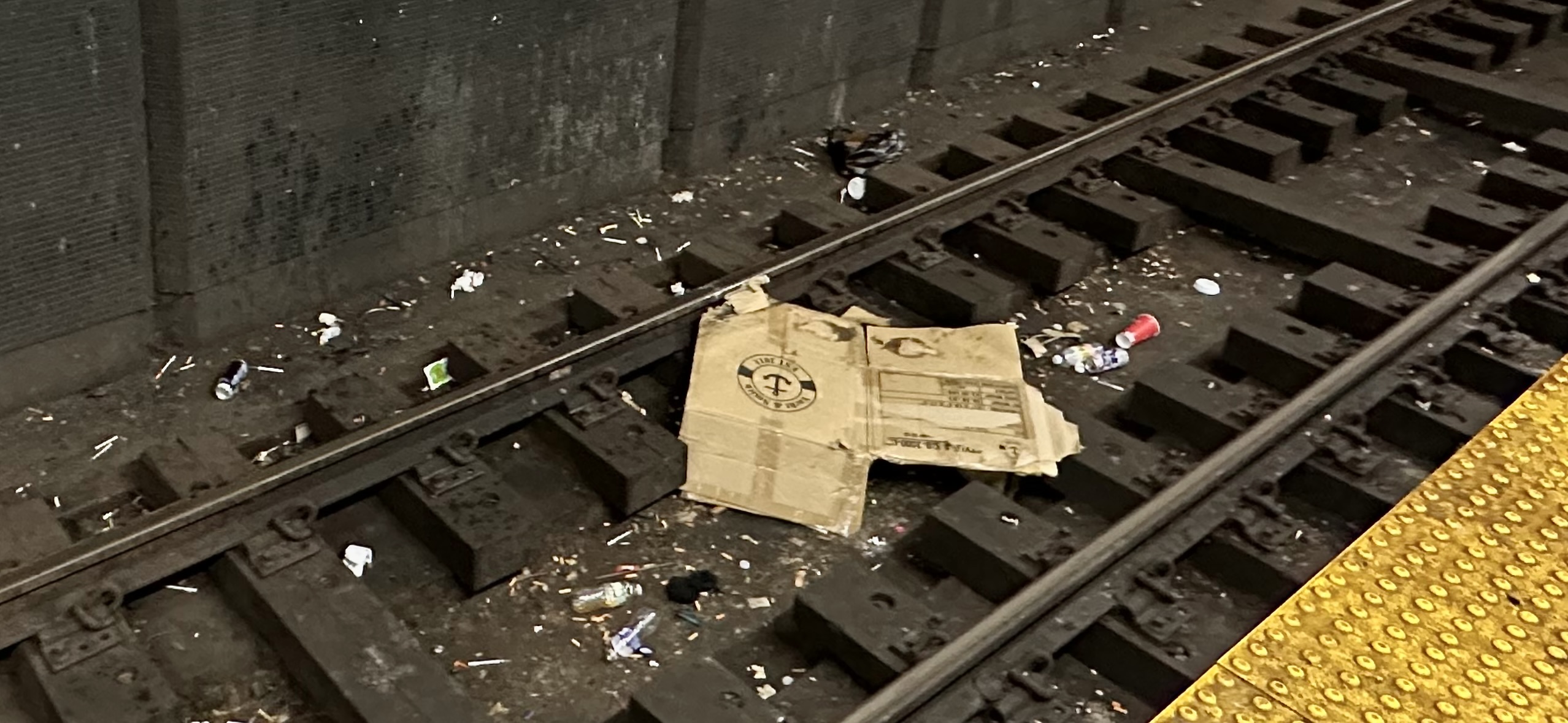There’s a pit underneath Philadelphia’s City Hall.
This pit is not some long forgotten architectural feature located deep within the bowels of the building with the unique distinction of being the largest city hall in the United States. Far from a distinguished feature of City Hall, this pit is yet another disgusting reminder of the moniker Philadelphia earned for itself: Filthadelphia.
Befitting Philly style, this filthy depository sports a formal name: the City Hall Station on SEPTA’s Broad Street, Market-Frankford and trolley lines.
Cleaning up SEPTA’s City Hall station could be a cornerstone for a civic pride campaign.
Philadelphia’s City Hall subway (and trolley) station is a locus for litter, particularly on the station’s tracks, which are perennially strewn with tossed cigarette butts, discarded fast food wrappers, chucked coffee cups and beverage containers plus other assorted junk-and-gunk. The trash on these tracks easily exceeds litter found on the tracks at many of the busiest subway stations in cities with populations far larger than Philadelphia, like New York City, London and Toronto.
Straight talk about this City Hall trash site: Don’t blame this trashing on tourists, suburbanites or slacking SEPTA janitorial workers. The prime producers of this mess are subway-riding Philadelphia residents — Philadelphians who smoke in this subway station despite SEPTA signage (and loudspeaker messages) banning smoking, Philadelphians who are too lazy and/or uncaring to make use of the station’s trash cans.
Yes, the City Hall subway station needs a facelift — and renovation. But the more immediate need is for errant subway riders to stop trashing this station.
A mayoral opportunity
This trashed subway station is not far from the office of Philadelphia Mayor Cherelle Parker on the second floor of City Hall. This creates an opportunity.
A proclaimed purpose of Mayor Parker’s commendable “Clean and Green Initiatives” is actions that can end Philadelphia’s persistent placement on lists of dirtiest cities in America. Parker, during a recent SEPTA-related press conference, declared people deserve a “clean mass transit system” that is also safe.
City Hall is the metaphorical center of Philadelphia, and cleaning up its subway station could have a ripples-on-a-pond effect, radiating a commitment to cleanliness across the city. Such a ripple effect would add momentum to Parker’s other desired de-dirtying actions like clearing trash-filled vacant lots and staunching the “short dumping” of debris in city parks.

Let’s be clear. Attacking the attytoods underlying Filthadelphia are as important as actually removing the detritus. Litter is seemingly embedded in the DNA of the city William Penn founded in 1682. Accounts about early times in this city contained in the book series Annals of Philadelphia — first published in 1830 — reference “extreme dirtiness” of streets.
Cleaning up SEPTA’s City Hall station could be a cornerstone for a civic pride campaign. Top elected officials could go downstairs to endorse an end to trashing. Media outlets could provide public service announcements that present reminders not to litter. Similar messaging could be repeated in schools. Major corporations could make donations to speed substantive renovations to the station.
There are examples of bold initiatives in Philadelphia to blunt blight. Former Mayor Michael Nutter began the installation of solar-powered trash cans to replace wire baskets. Mayor John Street removed thousands of abandoned vehicles from neighborhood streets. Spring cleaning campaigns enjoy community support citywide. Murals helped reduce rampant graffiti. While some initiatives succeeded better than others, those initiatives did step beyond the city’s accepted stance of filth-is-fine.
Initiatives to enable Philadelphia to escape its repugnant reputation as Filthadelphia require more citizens to make conscientious commitments to keep public spaces clean. Creating a culture of cleanliness across the city will require evolution of a new mindset among more Philadelphians about their responsibility to the collective.
More Philadelphians must limit their “trashing” to trash-talking about sports and turn away from trashing subway stations.
Linn Washington Jr. is a professor of journalism at Temple University. He has reported on and researched issues around Philadelphia for more than 40 years.
The Citizen welcomes guest commentary from community members who represent that it is their own work and their own opinion based on true facts that they know firsthand.
![]()
MORE ON CLEANING, GREENING — GETTING RID OF TRASH — IN PHILLY
City Hall. Photo by Theo Wyss-Flamm




